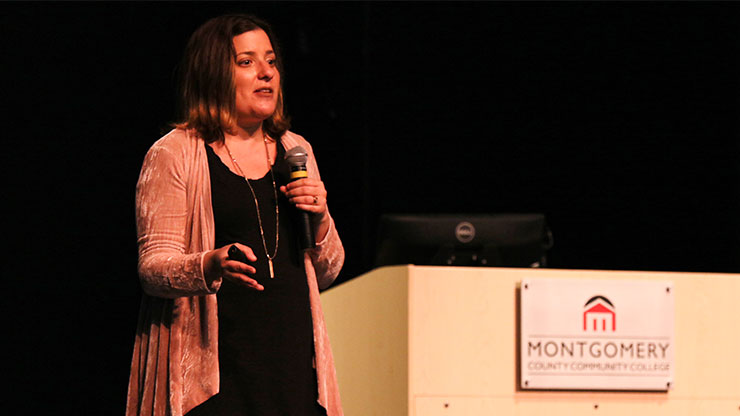
Dr. Sara Goldrick-Rab spoke about student food and housing insecurities at the annual Deans' Lecture. Photo by Lou Liguori
The financial challenges college students face today are not new, and they are not a fad. They are, according to Dr. Sara Goldrick-Rab, hard facts and reality for many students.
Goldrick-Rab, a leading national researcher/expert and thought leader on potential solutions for food and housing insecurities and other financial pressures endured by college students, served as the keynote speaker for Montco’s Deans’ Lecture on Nov. 5.
During recent years, she has been featured on The Daily Show with Trevor Noah, in The New York Times and on NPR. Her latest book, Paying the Price: College Costs, Financial Aid, and the Betrayal of the American Dream, (University of Chicago, 2016) is an Amazon best-seller and received the 2018 Grawemeyer Award. In 2016, POLITICO magazine named her as one of the top 50 people shaping American politics.
Goldrick-Rab is a professor of Higher Education Policy and Sociology at Temple University. She has led the three largest national studies on the subject. She recently launched the Hope Center for College, Community and Justice at Temple University.
During the lecture, Goldrick-Rab described how the new economics of college—higher tuition and costs, stagnant family incomes, shredded safety nets, low-paying jobs for students and underfunding of colleges—create the “perfect storm” that prevents students from completing their education.
“It’s not the cost of tuition alone, but the cost of living expenses, including housing, food and transportation that students cannot afford,” she said, explaining students often feel that the lack of cash seems to rule everything around them.
“Students in poverty spend more time working, more time working on their courses and less time sleeping,” she said. “They also spend more time commuting and taking care of others.”
During her presentation, Goldrick-Rab shared numbers from a HOPE Lab survey of 33,000 students from 70 community colleges in 24 states. The results showed that 56 percent of students experienced food insecurity and 51 percent had housing insecurity. Montco currently is participating in a similar survey, and the results will be available in approximately April 2019.
Goldrick-Rab discussed possible solutions for these issues, including creating a culture of caring across college campuses.
“This goes beyond charity and involves changing policies and practices,” she said. “It doesn’t mean the college becomes a social agency, but partners with social agencies.”
One community college in Texas, she explained, partnered with a local food bank and then offered food scholarships for students. Students could get groceries each week at the food bank using the scholarship funds. Other partnerships could help provide housing options, low-cost car repairs, tax services, etc.
Committed to student success, Montco has been working on providing a positive comprehensive educational experience that includes support services and programs for students to succeed in the classroom and beyond. In 2014, Montco launched its Stock Up for Success food pantries where students at both the Central Campus in Blue Bell and the West Campus in Pottstown can get ready-to-eat food.
Additionally in an effort to address students’ emotional well-being, MCCC recently became a JED Campus, and is the only community college in Pennsylvania (and is one of only 13 community colleges in the nation) to be accepted into this initiative.
JED Campuses are part of The JED Foundation, which guides schools through a collaborative process of comprehensive systems, program and policy development with customized support to build upon existing student mental health, substance abuse and suicide prevention efforts. During the upcoming year, Montco, working with JED, will be conducting research of the emotional needs of its student body and developing a plan of action.
